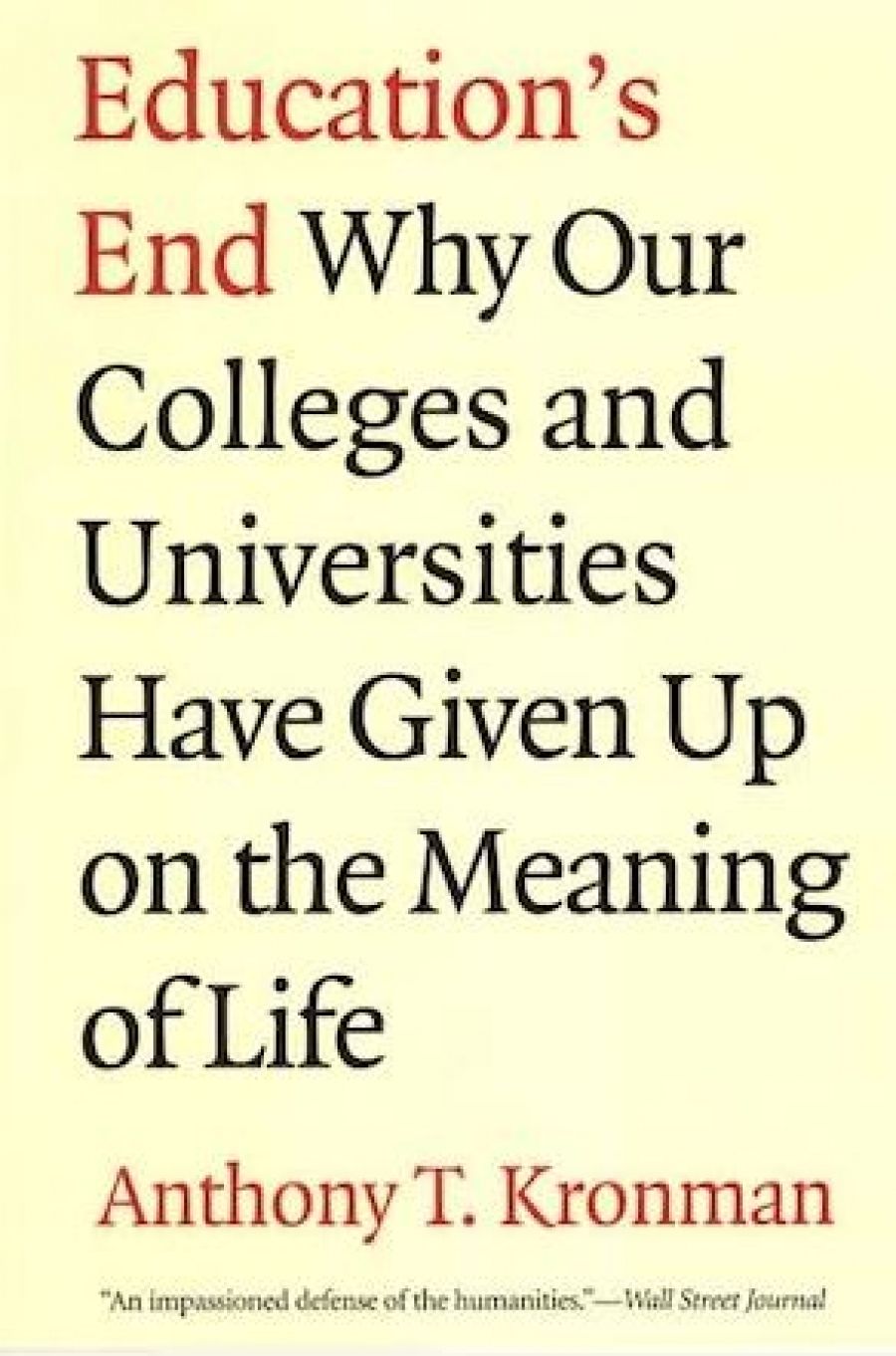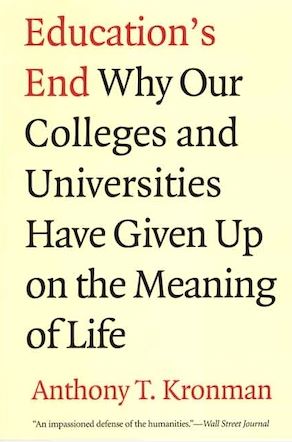
- Free Article: No
- Contents Category: Philosophy
- Custom Article Title: Deathless company
- Review Article: Yes
- Article Title: Deathless company
- Online Only: No
- Custom Highlight Text:
Travellers who go to Beijing usually visit the Great Wall. Along the way the government tour operators often take them to the Ming tombs, the final resting place of thirteen of the sixteen emperors of the Ming dynasty (1368–1644), three of which are now open to the public. The underground mausoleums have been cleared of all the grave goods and works of art that were set there to accompany the dead.
- Book 1 Title: Education's End
- Book 1 Subtitle: Why our colleges and universities have given up on the meaning of life
- Book 1 Biblio: Yale University Press, $49.95 hb, 319 pp
- Book 1 Cover Small (400 x 600):
- Book 1 Cover (800 x 1200):
The connection with former Yale law school dean Anthony T. Kronman’s Education’s End: Why Our Colleges and Universities Have Given up on the Meaning of Life is not immediately obvious but will become clearer in a moment. In writing about higher education, it is often remarked that, along with the Catholic Church, ‘the university’ is one of the few unbroken survivals from the medieval period. In truth, the contemporary university – with its nation-building and mass-education missions and its cutting-edge research – is very different from thirteenth-century Bologna, Oxford or Paris. The continuous occupancy of a small number of sites replete with gothic architecture does not change this, though it helps perpetuate the illusion of continuity. Nevertheless, talking up a long ancestry back to the Middle Ages or the Greeks is an occupational habit of university leaders, even though most of them are stuck in more prosaic boxes of steel and concrete from the 1960s and 1970s. Nowhere is the claim for tradition more insistent than in east-coast Ivy League universities in the United States, such as Princeton, Harvard and Yale, which see themselves as the spiritual home of the Western intellectual tradition.
This grand and amorphous claim, resting as it does across the fault-lines of geographical and historical displacement, lacks clarity and authenticity and must be continually defended. Education’s End is another in this long line of works. Kronman’s argument is couched in universal terms, but the topic is the humanities in American higher education.
Kronman argues that Charles Eliot’s reform of the undergraduate curriculum at Harvard, after the Civil War, triggered a century of pre-eminence for the humanities, but since the 1960s they have been in deepening crisis. The humanities were pre-eminent, he says, as long as they refused the full implications of modernism. In the nineteenth century, the antebellum American university was reshaped by the Humboltian revolution in German higher education, in which the principal end was the creation of new knowledge rather than the transmission of received knowledge. This had transformed German classical scholarship, which discovered evidence-based studies and historicisation, but in the United States the change was felt more in the sciences than in the humanities. Harvard and new schools such as Cornell and Johns Hopkins devised an agnostic compromise between the old didactic pedagogy and unthinking religious faith, and the German model.
Kronman calls this compromise ‘secular humanism’. Students were inducted into a small number of ‘relatively permanent’ and competing views of life in philosophy and literature, from Homer, Plato and Augustine to Aquinas, Shakespeare, Hume and Goethe (and later Mill, Emerson, Dostoevsky and T.S. Eliot). Undergraduates were meant to determine the purpose of their lives by locating themselves in their reading. Though history was one of the subjects of study, the canon was treated as timeless rather than historically referenced. Identity was treated as plastic to some degree, and vectored by an ongoing tension between Platonic virtue and social order, and the individuality and creative freedom expressed by German romanticism; but this limited plurality was played out within the bounds of a common Judaeo-Christian human nature.
The scholar-teacher in the humanities was the supreme guide to intellect, wisdom and the means of moral choice. For Kronman, the approach was epitomised in a course on ‘existentialism’ in his sophomore year in 1965 under Nathaniel Lawrence at Williams College. He wants everyone to have the experience; and since retiring as dean of law he has taught the canon in the Yale directed studies programme. But this approach is no longer in vogue. Kronman identifies two reasons. One is the research focus on discovery and originality, in which received scholarly wisdom is superseded. The other is ‘political correctness’, due to diversity-focused curricula, ‘multiculturalism’ and ‘constructivism’.
Kronman is convincing where he argues that scholarship rather than discovery should be central to philosophy, literature and language; and that good teaching is immersed in broad-based scholarship (though only if there is more space for hermeneutics and creativity than he would admit). Kronman’s own notion of scholarship is counter-modernist:
Teachers in the old order saw themselves as participants in an unchanging venture. They stood with their ancestors in what Max Weber called the ‘eternal yesterday’ of tradition. In doing so, they achieved a position immune to the corrupting powers of time. They experienced a kind of immortality, directly in their own lives and within the limits of their own experience. For the research scholar, this experience is no longer available … it is the scholar’s own insistence on the importance of originality that compels him to acknowledge the transience of his work, that deprives him of the experience of eternity in the deathless company of his ancestors, and leaves him facing death alone and unconsoled.
By teaching the great unchanging works, the secular humanist scholar achieves the immortality of the Ming. Kronman’s university is the mausoleum.
Education’s End is clearly written and for the most part gently argued, which makes the crude rhetorical expulsion of ‘political correctness’ all the more shocking and unpersuasive. The weakest point is the critique of multiculturalism. Kronman is hostile to programmes that extol ‘the equal worth of civilisations’ and that encourage one ‘to lose one’s allegiance to the West and replace it with a more expansive allegiance to humanity at large’. No comfort there for the UN Declaration. Samuel Huntington is not far away. Notwithstanding his unconscious convergence with the Ming, and eclectically chopping back and forth between liberalism and cultural superiority, Kronman repeatedly insists that the cosmopolitan project is ‘anti-Western’. On diversity, he rightly notes the corrosion engendered by racialised curricula, but exaggerates the problem, and responds in kind. The normatively charged character of this debate parallels the religiosity of American politics.
This cultural specificity undercuts Kronman’s claim to an explanation of the humanities universal to the whole of the West. Worse, throwing every post-1960s social and cultural theory into a bin marked ‘constructivism’ and defining this simply as nihilist relativism is a highly unconvincing move. Critique must understand and transcend the material that it seeks to overcome. No one who has come to grips with German, French or American historicism will agitate for the return of Kronman’s simpler world.
A ‘great books’ curriculum is a fine idea. But to limit the humanities to this, or to teach it without understanding the constructed character of cultural artefacts and social relations, is hardly a viable strategy and would dumb us down. Consider for example the third volume of Foucault’s History of Sexuality (1984), his brilliant reflection on the Romans and the origins of the ‘care of the self’. You will not find critical classicism of this kind in Kronman’s mausoleum. But that now stands as empty as the tombs of the Ming.



Comments powered by CComment